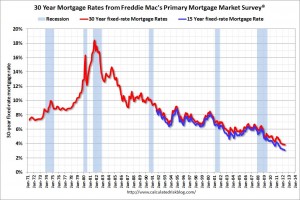
Ahh…
It seems like only yesterday that I was shaking my head in disbelief about mortgage rates heading below 4 percent. That was many mortgage moons ago, way back in September of 2011.
When Mortgage Rates Broke 4.00%
The catalyst at the time was the Federal Reserve announcement about Operation Twist, a program designed to press down on long term interest costs, namely 30 year mortgage rates. It did not take long either; the average rate on a 30 year mortgage fell below 4% in late 2011, and has remained in the 3.XX zone for most of the year so far.
This time, it’s all about Europe.
Mortgage Rates Now Break Below 3.00%
According to the latest survey data, the record low on 30 year fixed rate mortgages was established two weeks ago, and then maintained through last week. But stealing the show last week was a fresh new record low on 15 year mortgage rates. Now officially below the 3% mark at a survey average of 2.97%.
That is an eye-popping number.
Source of the Data
We’ve discussed the Freddie Mac mortgage rate survey before, and it can be a little misleading if you’re trying to get a live rate quote. However, when viewing the week by week trend in the numbers, you do get an accurate depiction of the market.
click here for a free, live rate quote
Is it Worth Committing to a Faster Payoff?
Applications for shorter mortgages, such as the 15 year, are on the rise. With the quicker payback schedule of a 15 year mortgage comes a higher payment than with a 30 year mortgage. This is despite the 15 year’s relative discount in the rate. And because 15 year mortgage payments are higher, qualification for a new 15 year loan is actually more difficult than it is for a 30 year loan.
So it may be the case that in order to break the 3.00% mortgage barrier, you’ll need to take out a smaller loan. Is it worth it? Sometimes there’s more to it than just the rate on the loan. For each consumer evaluating this decision, a different set of unique variables will apply.
We can help. Click here to check rates on 15 year and 30 year loans

